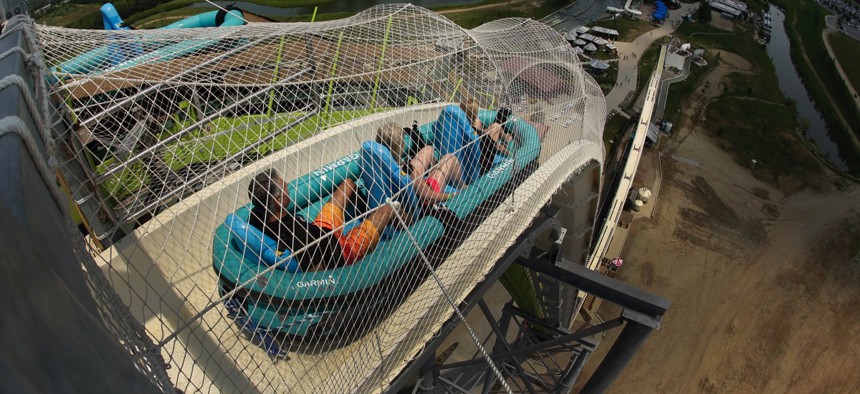Kansas Never Inspected World’s Tallest Waterslide; Slow Fire Dept. Response in Sacramento

The world's tallest water slide, "Verruckt", at Schlitterbahn Waterpark in Kansas City, Kan. Charlie Riedel / AP Photo
Also in our State and Local Daily Digest: Getting outdated Colorado statutes aligned with reality; radio silence in Anchorage; and lead-pipe issue in Portland schools.
KANSAS CITY, KANSAS
SAFETY OVERSIGHT | Due to state law, Kansas regulators never inspected the world’s largest waterslide before it was the scene of a deadly incident that killed a 10-year-old boy on Sunday. According to a 2009 state law, amusement park operators in the Sunflower State are required to inspect rides in permanent locations at least once a year and keep records on file in case the state needs to audit them. The operator of the Schlitterbahn amusement park says that their rides are inspected daily before opening. There aren’t consistent inspection rules across the nation, something amusement park analyst Ken Martin said is necessary. “Some of the states started good programs and some of the states started no programs. … Some check rides just at the start of the season and some do multiple spot checks.” The victim in the waterslide, incident, killed the son of a Kansas state legislator. The Verrückt waterslide is 17 stories tall. [The Kansas City Star; CNN]
SACRAMENTO, CALIFORNIA
EMERGENCY RESPONSE | Firefighters here take almost two minutes longer to arrive on emergency scenes than a national standard recommends, according to a report the Sacramento City Council will review Tuesday. In 90 percent of instances, it takes roughly five minutes and 55 seconds for the firefighters in the city to reach the site of an emergency. “The fire department growth has not kept pace with the growth of the city of Sacramento,” said department spokesman Christopher Harvey. “We have not hired to make up for all the of the people we lost during the recession.” [The Sacramento Bee]
DENVER, COLORADO
REPORTS | Talk about busywork. Reporting for several programs that no longer exist will cease Wednesday, part of a statewide push to eliminate unnecessary work in Health Care Policy, Financing and Education departments. “Many of the tasks that state departments perform are mandated in statute, and it takes legislation to change those mandates when those tasks are no longer necessary,” said state Rep. Kim Ransom. Lawmakers hope the changes will save state employee time and money. [The Denver Post]
HARRISBURG, PENNSYLVANIA
RAISES | Seventeen staffers in Gov. Tom Wolf’s office have received raises in the last eight months, but the thousands of other non-unionized state government employees are out of luck. Raises ran as high as 38 percent for promotions and added responsibilities due to restructuring. Wolf’s office said many positions were filled at a lower starting salary or blacked out saving $453,870. Non-unionized workers haven’t seen a raise in a year and a half. [Penn Live]
PORTLAND, OREGON
LEAD | Portland’s public school district was aware that its water fountains were giving off lead-contaminated drinking water. In an attempt to mitigate the problem, they resorted to installing filters they believed would reduce the amount of lead. It’s now clear that, year after year, efforts to monitor and install these filters were seriously flawed. In one incident, the district paid a firm to install 30 filters on fountains at 17 schools. They were meant to last until March. Instead, “schools opened for the year on Tuesday, September 6. This was the first day of use for the new fountains. The first filter to clog was two days later at Cleveland [High]. By Sept. 22, within 12 days of use, every filter was clogged." In addition, emails show that the district didn’t label tainted sinks in schools out of fear that a lead warning would be too alarming. [The Oregonian]
ANCHORAGE, ALASKA
POLICE | You won’t be able to listen in to Anchorage police and emergency response radio traffic anymore. The city has determined that the negative consequences to this level of transparency outweigh the positives and will not be reinstating the live broadcast of scanner information that had been suspended for months. Local media has serious concerns about losing their access to up-to-the-minute police and emergency information. But, city officials cite incidents involving the media as part of the reason for cutting this service. In once instance in 2012, chatter over the scanner indicated there was a gun at a local high school. The media picked it up before the police even arrived on the scene. Despite scanner broadcasts being cut, citizen efforts to monitor local police activity are flourishing. Once Facebook group for crowdsourcing this information now as more than 30,000 members—roughly one in every 10 people in Anchorage. [Alaska Dispatch News]





